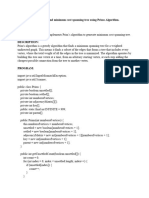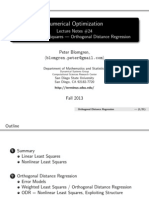0% found this document useful (0 votes)
70 views10 pagesMinimum Spanning Tree
The document describes C++ code to find the minimum spanning tree of a graph using Kruskal's and Prim's algorithms. It includes code for implementing Kruskal's algorithm using disjoint sets and union by rank. It also includes code for implementing Prim's algorithm using an adjacency matrix representation of the graph and tracking the vertices included in the minimum spanning tree.
Uploaded by
सतीश पाण्डेय (पाण्डेय जी)Copyright
© © All Rights Reserved
We take content rights seriously. If you suspect this is your content, claim it here.
Available Formats
Download as PDF, TXT or read online on Scribd
0% found this document useful (0 votes)
70 views10 pagesMinimum Spanning Tree
The document describes C++ code to find the minimum spanning tree of a graph using Kruskal's and Prim's algorithms. It includes code for implementing Kruskal's algorithm using disjoint sets and union by rank. It also includes code for implementing Prim's algorithm using an adjacency matrix representation of the graph and tracking the vertices included in the minimum spanning tree.
Uploaded by
सतीश पाण्डेय (पाण्डेय जी)Copyright
© © All Rights Reserved
We take content rights seriously. If you suspect this is your content, claim it here.
Available Formats
Download as PDF, TXT or read online on Scribd
/ 10
































































































